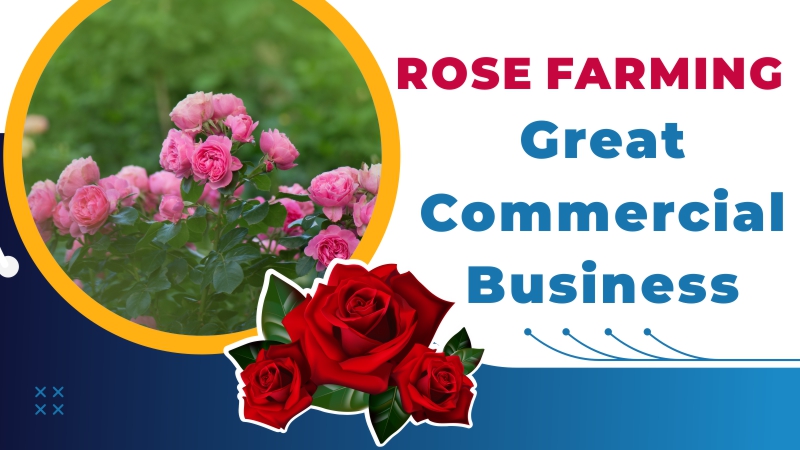The rose is referred to as both the “Queen of Flowers” and the “King of Flowers.” This suggests that its fundamental attributes include both kingliness (magnificence, status, and power) and queenliness (beauty, grace, and cultural refinement). It is superior to all other flowers in terms of beauty, color, and aroma. This is the reason it is regarded as one of the most popular flowers in the world. Gardens aren’t considered complete without roses. In many parts of the world, rose-only gardens have been created as a sign of appreciation for this flower. Rose farming is so popular that they are now grown commercially to supply the demand for cut flowers due to their wide variety in plant growth, flower color, shape, scent, and gradual opening.
On the basis of acreage, production, and consumption, it holds the top spot for cut flowers in the flower trade. India produces roses for Gulkand, rose water, rose essential oil, and cut flowers.
As we all know, One of the most popular flowers in the world’s floriculture is the rose. It is utilized on practically all occasions. Rose blooms come in a variety of sizes, shapes, and colors (from white to red or multicolor). Although most rose species are native to Asia, several are also found in Europe, North America, and Africa. Rose petals have a number of medical uses, including treating acne and relieving tension and sadness. Major rose-growing states include Karnataka, Tamil Nadu, Maharashtra, Bihar, West Bengal, Uttar Pradesh, Gujarat, Haryana, Punjab, Jammu and Kashmir, Madhya Pradesh, and Andhra Pradesh. Today, greenhouse farming is becoming more and more common, and growing roses in a greenhouse is especially popular because it results in higher-quality flowers than open-field growth.
Advantages of Rose Farming:
- The business of commercial rose farming is relatively simple and offers a lot of rewards. Actually, rose plants are planted all over the world. The plants often require minimal maintenance, and starting this business is relatively simple.
- The idea of growing roses for a living is quite old. This business is already being conducted by numerous people worldwide.
- Even beginners can cultivate rose plants because they require relatively little maintenance. Consequently, you can seize this chance to benefit.
- Roses are in great demand and are quite expensive. As a result, you should have no trouble selling your goods on the market.
- In general, rose plants may grow practically anywhere with very little maintenance.
- If you are an educated jobless person, commercial rose production may be a good business concept for you.
- For those who live in rural areas, commercial rose growing can be a significant source of employment.
- In this industry, production and other costs are comparatively lower. However, the payout is excellent. As a result, you will be able to earn a sizable profit.
- Selling roses is pretty simple. Almost everywhere in the world, roses are in high demand. In the nearby market, you should have no trouble selling your goods.
- A property is made more beautiful by roses. You’ll make a lot of money and have peace of mind from commercial farming.
- Roses provide a variety of medical benefits.
- Regular rose water consumption has several positive health effects. And if you plant your own roses, you can drink fresh rose water.
Climate requirement for rose farming:
Roses can be successfully cultivated in a variety of climates. In regions with warm, sunny days, chilly nights, moderate humidity, and no strong winds, quality flowers can be grown. It enjoys temperatures between 25 and 30°C during the day and 15 and 16°C at night. 12-hour days and humidity levels between 60 and 70 percent encourage growth and the creation of high-quality flowers. Long days are crucial for flower bud initiation, however light intensities have an impact on later stages of bud development. Under sheltered conditions, increased light and temperature encourage early flowering.
Selection of Site:
The choice of location is crucial for the optimal growth of roses. The location for planting roses should receive full-day sunlight. It prefers some shade during the hot days of the summer. Avoid placing the plantation area too close to tall trees in the garden rose. Even brief periods of waterlogging are not to its liking. The rose plantation’s area should be free of dust.
Soil and Land Preparation:
Rose plants thrive in medium loamy soil that is at least 40 to 50 cm deep and rich in organic content. A sufficient amount of moisture must be able to be held and retained by the subsoil. Rose plants don’t like heavy, clayey soils with inadequate air circulation. To make clay soil porous, it is recommended to combine sand and well-decomposed FYM. For roses, the ideal soil pH range is between 5.5 and 6.5, with an electrical conductivity of under 1. Because they are inert, sterile, and lack cation exchange capability, artificial media like cocopeat, perlite, and a combination of cocopeat and perlite are favored today. This allows applied nutrients to reach the rose plants directly.
Methods for Expansion:
- Stem Cutting: In most cases, mature stem cuttings are used to propagate rose rootstocks. This is the least expensive way of rose propagation. Particularly for growing Miniature, Polyantha, Climber, and Rambler roses, this method is used. Cuttings are typically made from healthy plants with one-year-old shoots. Cutting types, cutting seasons, growing media, moisture levels, species, and growth regulator treatments all have an impact on how well cuttings root. One, two, or more buds may be present on the cutting.
- Stenting: Roses may be quickly propagated by stenting. One dormant bud from the cultivar’s stem is grafted onto a rootstock. Stenting produces an entire plant in two to three months by concurrently forming a bud/graft union and adventitious roots.
To get detailed information about rose farming and other crops farming, install the KhetiGuru application for all farming related updates. For tractor, tractor-price, popular tractors, tractor games related updates and information install KhetiGaadi application.




